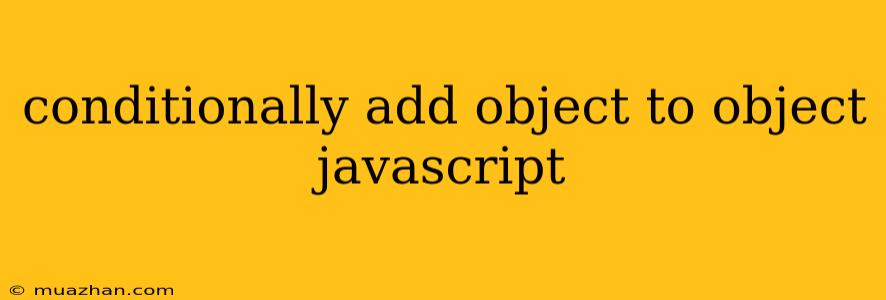Conditionally Adding Objects to Objects in JavaScript
Adding objects to objects in JavaScript can be achieved using various methods, depending on the desired outcome and the condition involved. This article explores different techniques and provides practical examples for understanding conditional object addition in JavaScript.
1. Using the Ternary Operator
The ternary operator offers a concise way to add an object conditionally. This approach involves evaluating a condition and assigning an object based on its truthiness.
const obj = {};
const condition = true;
obj.newProperty = condition ? { value: 'added' } : {};
console.log(obj); // Output: { newProperty: { value: 'added' } }
In the above example, the condition variable dictates whether the newProperty is added with the value { value: 'added' } or an empty object.
2. Using if Statements
Traditional if statements provide a more readable and explicit way to handle conditional object additions.
const obj = {};
const condition = false;
if (condition) {
obj.newProperty = { value: 'added' };
}
console.log(obj); // Output: {}
This code snippet demonstrates adding the newProperty only if the condition variable evaluates to true. Otherwise, the object remains unchanged.
3. Using Object Destructuring
Object destructuring allows for a more elegant approach to add a property conditionally. This technique utilizes the optional chaining operator (?.) to safely access a property.
const obj = { existingProperty: 'value' };
const condition = true;
const newProperty = condition ? { value: 'added' } : undefined;
obj = { ...obj, ...newProperty };
console.log(obj); // Output: { existingProperty: 'value', value: 'added' }
Here, the newProperty is only added if the condition is met. The optional chaining operator ensures that the destructuring process ignores undefined values, avoiding potential errors.
4. Using the Spread Operator
Similar to object destructuring, the spread operator (...) can be used to add properties to an object conditionally.
const obj = { existingProperty: 'value' };
const condition = false;
const newObj = { ...obj };
if (condition) {
newObj.newProperty = { value: 'added' };
}
console.log(newObj); // Output: { existingProperty: 'value' }
In this example, a new object newObj is created using the spread operator. Then, the newProperty is added only if the condition is true. This approach ensures that the original object remains unchanged.
Choosing the Right Method
The best approach for conditionally adding objects to objects depends on the specific situation. The ternary operator is ideal for concise code, while if statements offer greater readability. Object destructuring and the spread operator provide elegant solutions for creating new objects with conditional properties. Choose the method that best suits your needs and coding style.
